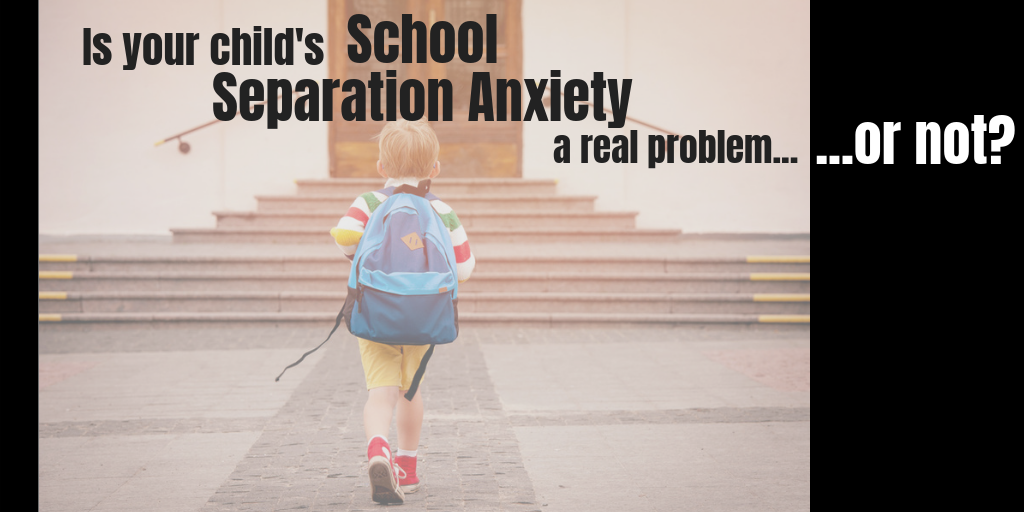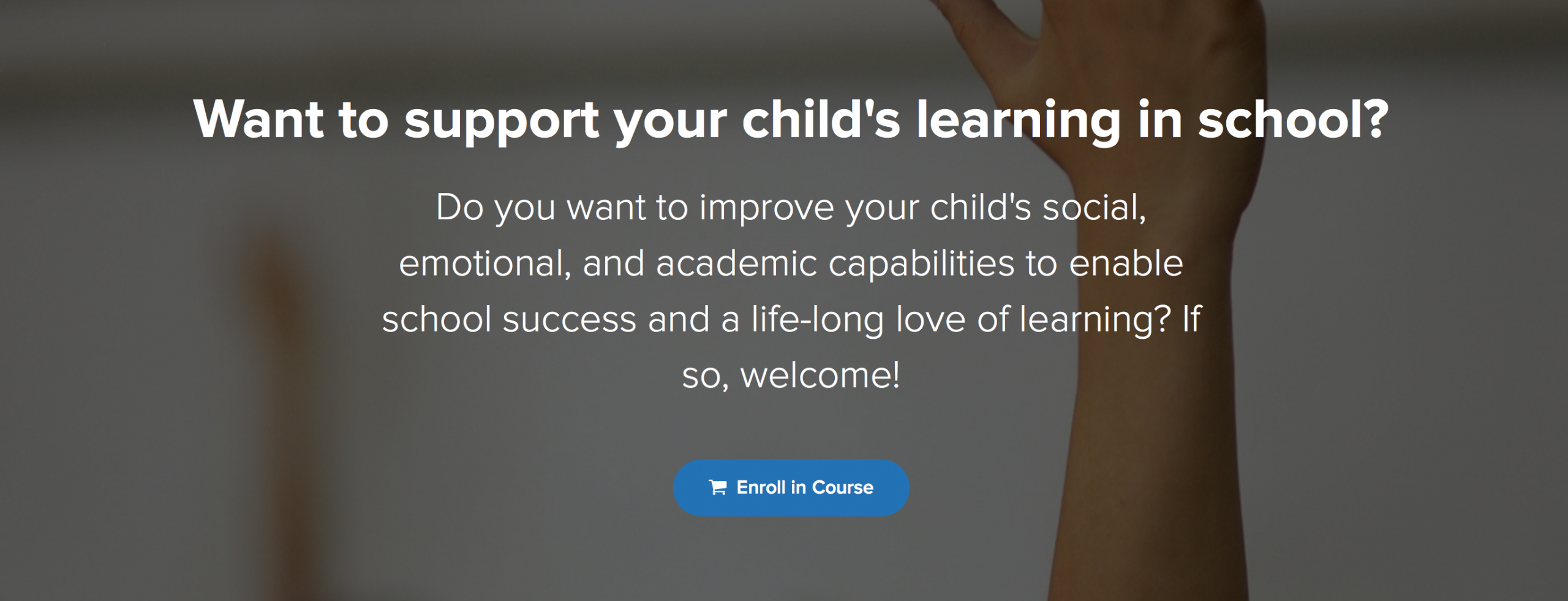Is your child’s school separation anxiety a real problem – or not?

School’s in! How’s it going for you and your child?
On the first day of school, did your child give you a sweet hug and run off cheerfully to play with their friends?
Or were they stuck to you like a limpet, screaming “Don’t go! Don’t go!” as you tried to extricate yourself, highly ambivalent yourself about whether this transition was the right one to make?
And on the second day, did they happily get into the car and strap themselves in, or skip along beside you as you walked to school?
Or did they dig in their heels and refuse to get into the car seat, and then refuse to get out of the car at the other end, and give you the “Don’t go! Don’t go!” treatment again?
~sigh~
Transitions are tough, right? And the transitions to preschool/kindergarten/school are among the toughest, because they’re some of the first ones that your child essentially needs to learn to navigate by themselves.
How can we make this easier on our children, and on ourselves?
I have a couple of episodes queued up in the next few weeks that are going to help with this, but I know a lot of you are in the thick of it right now so wanted to offer some ideas based on those interviews. One interview was with Dr. Arietta Slade, an internationally-recognized attachment theorist, and the other was with Dr. Jonathan Dalton, who leads the Center for Anxiety and Behavioral Change in Rockville, Maryland, and who specializes in helping children with what is known as “school refusal.”
Firstly, know that it’s normal for children to have some trouble with the school transition. It’s normal for them to want to spend time with you: you’re who they know and trust. Think about it from their perspective: they don’t know the teachers or the other students or the environment; they don’t know you spent months agonizing over the decision about where to send them and that it’s as safe as anywhere can be. All they know is that you’ve said they have to go to this place where they don’t know anyone or any of the systems and routines that make the place work, and they have to try to figure it out by themselves. And they’re still so small! No wonder they have a hard time with it.
Hopefully, your school allows you to be with your child in the classroom for a period of time for the first few days. Making transitions longer than usual (for example, by reading a book or playing a game) is a great way to start to get your child comfortable with the environment. The school may have a process they like parents to follow when it’s time to go – perhaps a hug, a goodbye, and a high-five through the window.
Some crying during the first week of this transition is very normal. If your school (and you, and your child) are of the especially gentle variety they may allow you to stay in the classroom for an extended period of time during the first week. But most schools want parents to be mostly out of the way so the teachers can take care of the work of integrating the children, which is likely to result in more crying. The school may ask you to bring in a set of photos of your family to put in an album that they can direct the child toward when they are struggling during the day.
Dr. Slade will remind us to not make it harder on yourselves by making our ‘goodbye’ quick and clean: a hug, a “goodbye,” and out the door. (And don’t sneak out without saying goodbye – it might be easier in the short term, but it can lead to trust issues when your child realizes you left without them knowing). Don’t say “I’m leaving now…OK, I’m going to go…are you SURE you’re going to be OK?…” which can lead to tears that otherwise wouldn’t have happened.
How do I know if this is a transition my child will work through, or if it’s a real problem?
The key to understanding whether there is really a problem is to be sure to ask the teacher at the end of each day how the day went. You’re looking for a general improvement over time – there may be days where things back-slide after they’ve been going well for a while, which is also normal. But the one reliable indicator you can look out for is what your child is like fifteen minutes after you’ve left the building. If your child is happily engaged with others and is playing as they might at home by then, then no great harm is being done. If the child spends periods of time throughout the day – especially substantial periods of time – upset, then the situation is one you might want to reevaluate.
If your child is having substantial difficulties, you can try asking them why they don’t want to go to school – which might give you a useful answer that you can address, although Dr. Dalton reminds us that children might not always know (or be able to articulate) their reasons. (I was reminded of this this morning when my four-year-old had a tantrum ostensibly because I drew some lines next to the dinosaur toy we had drawn around so we could measure it more easily, but was probably actually because I was away for several hours yesterday on a long bike ride and she missed me.)
If you don’t get a useful answer, you can try to ask the teacher what seems to be triggering the upset – perhaps your child hasn’t yet made friends, or perhaps they are struggling with adapting to the systems and routines of the school.
Your options about what to do about your child’s feelings are defined both by your approach to parenting, as well as by your reasons for putting them in school in the first place.
If the child is in school because you are going to work and your family needs your income, and family care or other avenues are not an option, then it doesn’t seem like your child has much of a choice: they need to be in school. The reality is that children are highly adaptable and the majority of them will end up making friends and fitting in at school, even if they struggle in the beginning.
But some parents don’t want their child to experience the discomfort that will occur during this process, or the cause of the discomfort is not something that’s likely to go away (e.g. a personality mismatch with a teacher, and there is no opportunity to move to a different class), and you have the financial option to not have your child in school, then you may choose to pull them out.
This is unlikely to be a big deal at the preschool level, although at the school level the choice becomes more difficult. The statistics on school refusal indicate that children who refuse school have worse academic outcomes than those who attend routinely, so if you intend for your child to attend school, this is an issue that needs to be addressed.
A visit to your pediatrician can rule out any illness of physical origin (your child might complain of headache or stomachache, although this could just be a delaying tactic…); if the anxiety persists then ask for a referral to a child psychologist or a psychologist who specializes in treating anxiety, like Dr. Dalton.
Regular listeners might recall that I spent a year researching the decision to homeschool my daughter, and based on that I really wouldn’t advocate for choosing homeschooling because of school refusal unless it’s due to a situation that really cannot be changed or addressed (which does sometimes happen).
Or perhaps you’re settling into the school year a bit and you’re starting to recognize some of the limitations of the school system, like large class sizes, over-worked teachers, a focus on using rote memorization to prepare for standardized tests, and the fact that by third grade, our curious toddlers who essentially would never stop asking questions no longer ask any questions except “HOW do I do this thing you’ve asked me to do” and “will this be on the test?”.
If you’re thinking about homeschooling but you can’t get your head around the legalities of it, or whether your child would be able to get into college, or how they would be socialized, or how you could afford to homeschool, or if you’re under the impression that only “certain kinds” of people homeschool, then you might be interested in a course that I developed to help parents figure out if homeschooling is right for them (and you might also be reassured to learn that secular homeschoolers are the fastest-growing group right now).
If you’re even vaguely interested in learning more about homeschooling, you might want to head over to yourhomeschoolingmojo.com and take the free quiz on that page that emails you *personalized* results about your readiness for homeschooling right now. Click the image to take the quiz and learn more about the course:
And if you already know that homeschooling isn’t right for you, for whatever reason, I actually have another course that might be a better fit for you called Supporting Your Child’s Learning in School. Parental participation in children’s learning has been shown time and time again in research studies to be crucial to a child’s academic success, but there are so many different ways to participate that you might wonder which ones are most effective in your specific circumstance. The course can help you to understand this, as well as understand how your child’s brain processes knowledge related to reading and math, so you can help to get them ready for success in school in a low-pressure way (no flash cards!)
Click the image to learn more about this course (as well as to grab a free infographic on 11 things you can do to help your child learn key math concepts using simple, everyday activities):
Both courses are designed for parents of children aged between about three and eight; you could take them on the earlier side if you really like to prepare in advance, like I do, or if you think you will need extra time to put systems in place like shifting careers to prepare for homeschooling.
Or if you want to do them in the year before your child starts Kindergarten then that would be a good time, or if your child is already in school but you see signs of problems, either in your own perception of school or in how your child interacts with the school system, then they could work for you at that point too.
As always, let me know if you have questions by dropping me an email through the contact form here.



